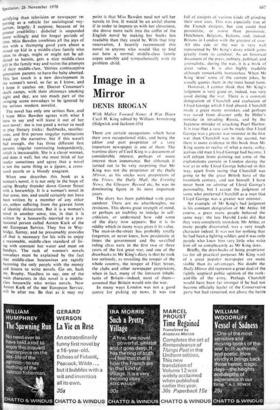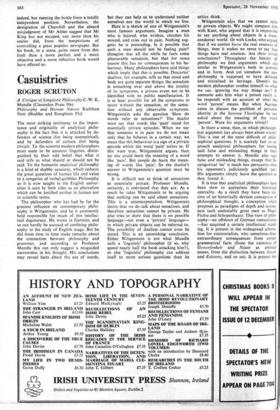Image in a Mirror
DENIS BROGAN
With Malice Toward None; A War Diary Cecil H. King edited by William Armstrong (Sidgwick and Jackson 65s) There are certain occupations which have their own occupational risks, and being the editor and part proprietor of a very important newspaper is one of them. The wartime diary of Cecil King is a document of considerable interest, perhaps of more interest than importance. But although it turned out to be very surprising that Mr King was not the proprietor of the Daily Mirror, as his uncles were proprietors of the Times, the Daily Mail, the Evening News, the Glasgow Record etc, he was its dominating figure in its most important years.
The diary has been published with great candour. There are no afterthoughts, no revisions. This shows great strength of mind, or perhaps an inability to indulge in self- criticism, or understand how odd some of the diary now appears. But it is its oddity which in many ways gives it its value. The man-in-the-street has probably totally forgotten, or never knew, how pessimistic at times the government and the so-called ruling class were in the first two or three years of the last great war, and one of the drawbacks to Mr King's diary is that he took too seriously, as revealing the temper of the whole country, the temper of Fleet Street, the clubs and other newspaper proprietors, when in fact, many of the innocent inhabi- tants of Britain—indeed, most of them— assumed that Britain would win the war.
In many ways London was not a good centre for picking up news. It was too
full of emigres of various kinds all grinding their own axes. This was especially true of the French emigres, but you could find pessimistic, or worse than pessimistic, Dutchmen, Belgians, Italians, and, indeed, Britons in London 's ith the greatest of case. All this side of the war is very well represented by Mr King's diary which gains greatly from its candour. As an historical document of the press, military, political, and journalistic, during the war, it is a book of great value. It is also highly readable although remarkably humourless. When Mr King 'does' some of the current jokes, he usually quotes them in the most banal form.
However, I cannot think that Mr King's judgment is very good or, indeed, was very good during the war. There is a constant denigration of Churchill and exaltation of Lloyd George which I find absurd. Churchill made a great many mistakes, and perhaps was saved from disaster only by Hitler's mistake in invading Russia, and by the Japanese mistake of attacking Pearl Harbor. It is true that a case can be made that Lloyd George was a greater war minister in the first war than Churchill was in the second, but there is more evidence in this book than Mr King seems to realise of what a nasty, sulky, jealous old man Lloyd George had become. I will refrain from pointing out some of the explanations current in London during the war as to why Lloyd George behaved in this way, apart from seeing that Churchill was going to be the great British hero of the twentieth century, and not himself. I have never been an admirer of Lloyd George's personality, but I accept the judgment of some who preferred Churchill as a man that Lloyd George was a greater war minister.
An example of Mr King's had judgment is his constant denigration of Mr Attlee. Of course, a great many people behaved the same way: the late Harold Laski did. But they were completely mistaken. Mr Attlee, as many people discovered, was a very tough character indeed. It was not for nothing that he had been a fighting soldier, and it was only people who knew him very little who write him off so complacently as Mr King does.
Briefly,'the drawbacks of being proprietor (as for all practical purposes Mr King was) of a great popular newspaper are more visible than its advantages. No doubt the Daily Mirror did represent a great deal of the rightly sceptical public opinion of the rank- and-file of the army. Perhaps Churchill would have been far stronger if he had not become officially leader of the Conservative party but had remained, not above the battle indeed, but running the battle from a totally independent position. Nevertheless, the denigration of Churchill and the absurd misjudgment of Mr Attlee suggest that Mr King has not escaped, any more than his uncles did, from the temptations of controlling a great popular newspaper. But his book, in a sense, gains more from this fault than a more perfect and a more objective and a more reflective book would have offered m.















































 Previous page
Previous page